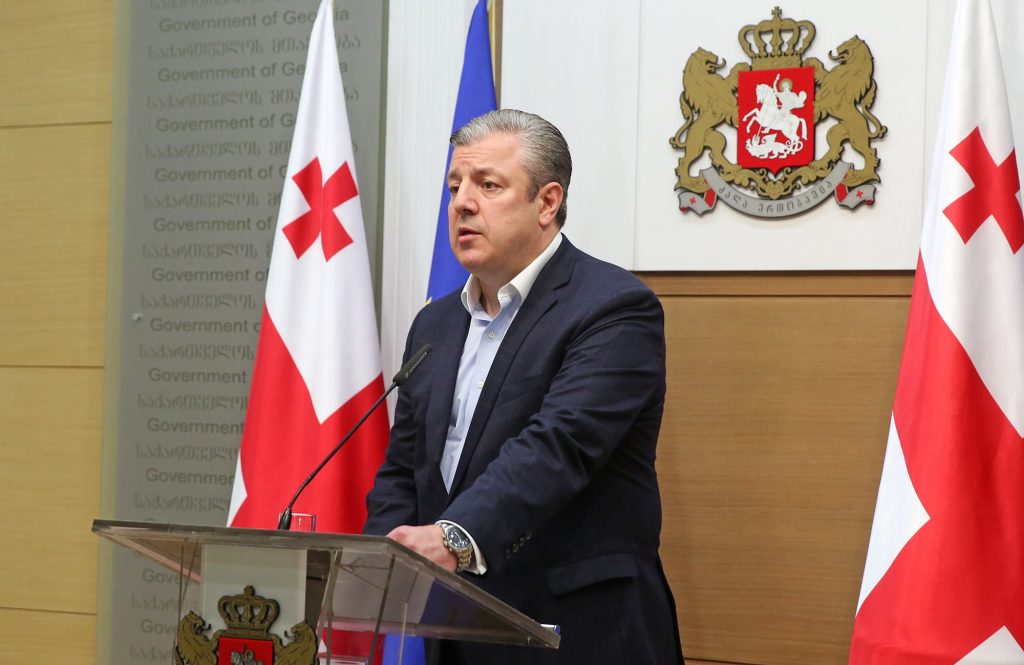Georgian Prime Minister Giorgi Kvirikashvili, who held the prime ministerial post since December 2015, announced his resignation in a live televised statement on Wednesday evening.
Opening his eleven-minute address, Kvirikashvili cited “differences of opinion” regarding his economic policies with ruling party members as a reason for his resignation.
PM Kvirikashvili also noted that in recent months he has had differences “on certain fundamental issues” with Bidzina Ivanishvili, chairman of the ruling Georgian Dream-Democratic Georgia party.
“I think, time has come to allow the party chairman to assemble a [new governmental] team based on his views,” he added.
Kvirikashvili then noted that he wanted to clarify some details of his economic policies.
“Over the last 2.5 years, under my leadership the country has implemented tremendously important reforms, and despite extremely difficult political, economic and security situation in the region, we managed to create a stable environment in Georgia and put the country on the right track of development,” he said.
“Today, we have the highest economic growth in the region, the most favorable environment for doing business, secure property rights, and free trade agreements with the world’s largest markets,” Kvirikashvili added.
Kvirikashvili also noted that his Government’s “pragmatic” foreign policy, has made the country “secure and stable.”
“Today, we are as close to the European Union and NATO as never before; we also enjoy an unprecedented support from our strategic partner – the United States – and the European Union; we have also voiced our readiness to take further steps for settling our relations with Russia in the Geneva talks format, and I believe sooner or later these proposals will yield positive results,” he stressed.
Rightist Steps for Long-Term Growth
Kvirikashvili touched upon his four-point action plan as well, saying the reform package was “a right” solution for Georgia’s long-term development.
“I know full well the hardships that people are going through, that we have many families who can barely make their ends meet. This is a fact, but I also know it well, that if not for our policies, the possibility of creating decent living conditions for these people, would be a far lengthier prospect – which I would not have allowed myself,” he said.
“I believe it is the duty of every responsible politician, and of the Prime Minister in particular, to implement decisions that can be unpopular, that are based not on immediate, one-time returns, but the country’s long-term development,” Kvirikashvili added.
Kvirikashvili then underlined that his government implemented several of such decisions, including “the floating exchange rate, gradual increase of key policy rate,” as well as the steps against dollarization and excess debt.
“Of course, we could have fixed the exchange rate, which would have eased the situation for the people at that point, but we would have wasted our reserves and we would not have gotten the economic growth dynamics that we have today,” he also noted.
“So, these were painful, but conscious decisions… rightist decisions that have brought about the current dynamics [of growth],” Kvirikashvili said.
The Georgian media first reported Kvirikashvili’s possible resignation on yesterday evening, following his reported disagreement with Bidzina Ivanishvili at the party leadership meeting that day.
The Georgian Dream lawmakers and government officials, however, were either denying it as a rumor or responding that they merely discussed UNICEF’s recently-published Welfare Monitoring Survey.
What now?
Under article 79 of the Constitution of Georgia, resignation of a Prime Minister or termination of his/her tenure shall result in termination of the tenure of other members of the Government. The ruling Georgian Dream party has to name a new prime minister now, who will then nominate cabinet members to face parliament’s confidence vote, requiring the support of at least 76 MPs.
This post is also available in: ქართული (Georgian) Русский (Russian)

